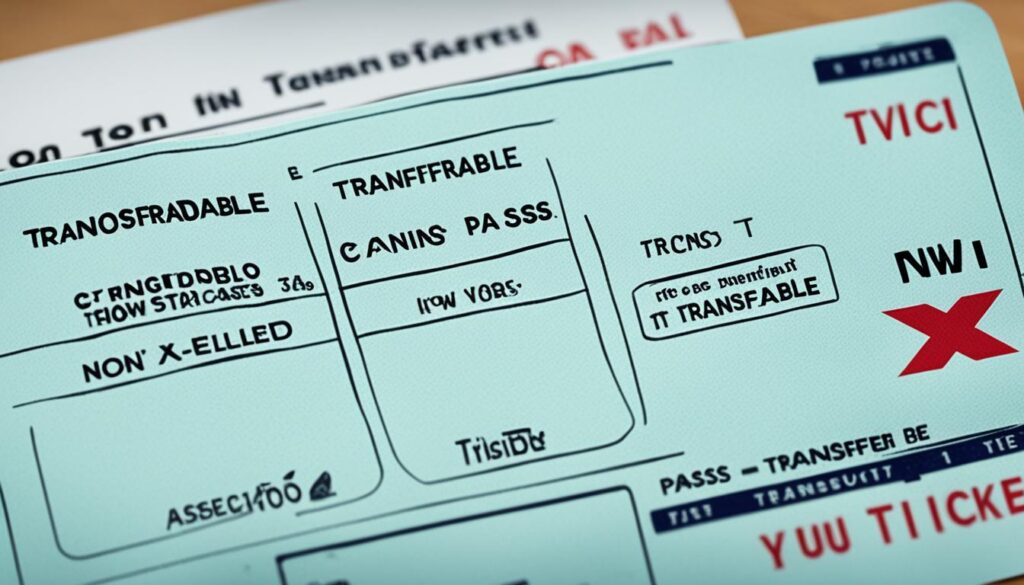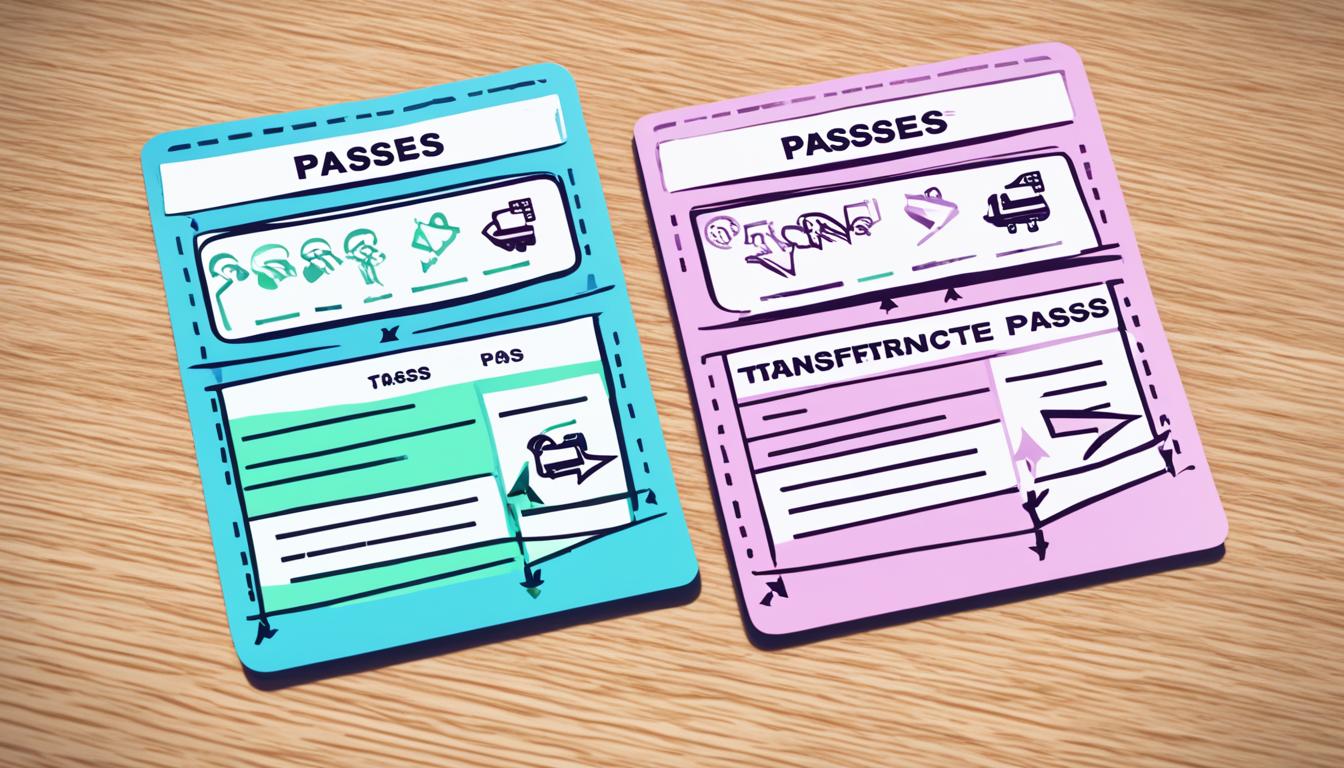When it comes to airline tickets, it’s crucial to understand the difference between transferable and non-transferable passes. The terms transferable and non-transferable refer to whether or not a ticket can be given to another person for use. Let’s take a closer look at the distinction between these two pass types and the benefits they offer.
Transferable passes allow you the flexibility to transfer your ticket to another individual if your plans change or if you’re unable to travel. This can be a valuable option, especially if you frequently book flights for others or if you anticipate the need to transfer your ticket in the future.
On the other hand, non-transferable passes are solely for the use of the person whose name is printed on the ticket. These passes are commonly used by airlines as a security measure to prevent fraudulent activities and ensure passenger safety. When you book a non-transferable pass, the name on the ticket must match the traveler’s identification documents.
Key Takeaways:
- Transferable passes offer the flexibility to transfer your ticket to another person, while non-transferable passes are solely for your use.
- Non-transferable passes are implemented by airlines as a security measure.
- When booking a non-transferable pass, the name on the ticket must match the traveler’s identification documents.
- Transferable passes can be beneficial if you frequently book flights for others or anticipate the need for ticket transfers in the future.
- Review the terms and conditions of your ticket to determine its transferability.
The Importance of Personal Details
When booking an airline ticket, it is essential to provide accurate personal details, including your full name and date of birth. These personal details play a vital role in identity verification and adherence to security protocols. By ensuring that the ticket bears the same name as provided, airlines can maintain passenger safety and security throughout the travel experience.
When you provide your full name and date of birth during the booking process, the ticket issued will reflect this information. It is crucial to note that only the individual whose name is printed on the ticket is authorized to travel using that ticket. This strict policy helps airlines prevent unauthorized individuals from traveling and helps maintain the integrity of the airline’s security measures.
By enforcing the requirement for personal details on airline tickets, airlines can minimize the risk of fraudulent activities and enhance the overall safety of air travel. These measures also assist in smooth check-in processes and ensure that the right passengers are boarding the aircraft.
Therefore, it is of utmost importance to provide accurate personal information when booking airline tickets. Failure to do so may result in denied boarding or additional security checks, causing unnecessary delays and inconveniences. Always double-check that the information you provide matches your identification documents to avoid any issues on your travel day.
Remember, personal details on airline tickets are not only essential for travel security but also for your peace of mind. By adhering to these requirements, you can enjoy a safe and hassle-free journey.
Exploring Name Change Policies
Understanding the name change policies of airlines is crucial when planning your travel. Airlines typically have strict restrictions on name changes to ensure passenger safety and prevent fraudulent activities. However, it’s important to note that there may be exceptions to these policies, and some airlines offer alternative options for ticket changes. Let’s dive deeper into the world of airline name change policies and explore the restrictions and exceptions.
Restrictions on Name Changes
Most airlines have a no-name change policy, meaning that once a ticket is booked, the name on the ticket cannot be changed. This policy is in place to maintain security and prevent unauthorized individuals from using a ticket issued under someone else’s name. It’s important to verify the accuracy of the passenger’s name when booking the ticket to avoid any issues later on.
“Once a ticket is booked, the name on the ticket cannot be changed.”
If you realize that there’s a spelling mistake in the passenger’s name, it’s recommended to contact the airline as soon as possible. Some airlines may allow minor name corrections, but major changes or transferring the ticket to another person are generally not permitted.
Exceptions to Name Change Policies
While non-transferable name change policies are widely implemented, there are exceptions to consider. Certain airlines, especially low-cost carriers, may have more lenient cancellation policies that offer alternative options. These alternatives may include receiving credit for future travel or transferring the ticket to another person for a fee.
It’s important to carefully review the terms and conditions provided by the airline to determine if your ticket is eligible for any changes or transfers. Each airline has its own specific policies, and it’s best to familiarize yourself with them before making any decisions.
To give you a better understanding of the variation in airline name change policies, here’s a comparison table:
| Airline | Name Change Policy | Transferability Options |
|---|---|---|
| Airline A | No name changes allowed | N/A |
| Airline B | Minor name corrections permitted | N/A |
| Airline C | No name changes allowed | Credit for future travel |
| Airline D | No name changes allowed | Transferable with fee |

Remember, each airline may have its own specific policies, so it’s essential to check with the airline directly for the most accurate and up-to-date information regarding name change options.
By understanding the name change policies, restrictions, and exceptions offered by different airlines, you can make informed decisions when planning your travel. This knowledge empowers you to navigate the complexities of airline ticket changes confidently.
Exceptions: Transferable Tickets
While most airline tickets are non-transferable, there are exceptions to this rule. Certain low-cost carriers, such as easyJet and Ryanair, offer the option to transfer your flight ticket to another person for a small fee. This flexibility can be incredibly beneficial in situations where unforeseen circumstances prevent you from traveling. It allows you to avoid losing the value of your ticket and allows someone else to make use of it instead.
However, it’s important to note that not all budget airlines provide this alternative. It’s crucial to verify the transferability of your ticket before making any arrangements. Make sure to review the terms and conditions provided by the airline to understand if your ticket can be transferred and what the associated fees or restrictions may be.
Being aware of the availability of transferable options on low-cost carriers can provide you with peace of mind when unexpected situations arise. It’s an additional layer of flexibility that ensures your ticket’s value is not wasted and allows for a smoother travel experience.
| Airline | Transferability | Associated Fees |
|---|---|---|
| easyJet | Transferable | Small fee |
| Ryanair | Transferable | Small fee |
Reading the Fine Print
When purchasing airline tickets, it is crucial to take the time to read and understand the fine print and terms and conditions associated with your booking. These documents contain valuable information that can help you avoid unexpected surprises and make informed decisions about your travel plans. By paying attention to the details, you can ensure a smoother and more enjoyable journey.
Understanding Ticket Transferability
One important aspect to consider when reading the fine print is ticket transferability. Some airlines may allow you to transfer your ticket to another person, while others have strict non-transferable policies. It’s important to determine whether or not your ticket can be transferred and under what conditions. This will be outlined in the terms and conditions provided by the airline.
Cancellation Policies and Fees
Another key area to review is the cancellation policy. Airlines often have different rules and fees associated with canceling a ticket. By understanding the cancellation policy in advance, you can assess the potential financial implications of changing or canceling your plans. This knowledge allows you to make informed decisions based on your individual circumstances.
Avoiding Surprises
By thoroughly reading the terms and conditions, you can avoid any unpleasant surprises that may arise during your travel. It’s important to be aware of any restrictions or limitations imposed by the airline, such as baggage allowances, seating arrangements, or additional charges. Armed with this knowledge, you can plan accordingly and ensure a stress-free experience.
Remember, taking the time to read the fine print is an essential part of the travel planning process. It empowers you to understand the details of your airline ticket and make informed decisions that align with your needs and preferences. So, before you embark on your next adventure, set aside some time to carefully review the terms and conditions provided by the airline. Your effort will pay off in smoother travels and fewer surprises along the way.

| Key Points to Consider: | Benefits: |
|---|---|
| Review the ticket transferability | Makes it easier to adjust travel plans |
| Understand cancellation policies and fees | Avoid financial surprises |
| Be aware of any restrictions or limitations | Plan your travel accordingly |
Conclusion
In conclusion, understanding the difference between transferable and non-transferable passes is essential for navigating the complexities of air travel. Most airline tickets are non-transferable to prioritize passenger safety and security. However, some airlines may allow minor name changes to rectify spelling mistakes. It is crucial to carefully review the terms and conditions of your ticket to determine if any amendments or transfers are possible.
While certain low-cost carriers offer transferable options, this is not the industry standard. It’s important to note that each airline has its own policies regarding ticket transferability and name changes. Familiarizing yourself with these policies can help you plan your journey more effectively and avoid any surprises or inconvenience.
By having a clear understanding of transferability and name change policies, you can have a smoother journey. Remember to provide accurate personal details when booking your ticket and always review the fine print. This way, you can ensure compliance with security protocols, reduce the risk of travel disruptions, and enjoy a stress-free travel experience.
FAQ
What is the difference between transferable and non-transferable passes?
Transferable passes cannot be given to another person, while non-transferable passes are solely for the use of the person whose name is printed on the ticket.
Why are most airline tickets non-transferable?
Most airline tickets are non-transferable to prioritize passenger safety and security.
Are there any exceptions to the non-transferable rule?
Yes, certain low-cost carriers, such as easyJet and Ryanair, offer the option to transfer your flight ticket to another person for a fee.
Why are personal details like full name and date of birth important on airline tickets?
Personal details are crucial for identity verification and adherence to security protocols.
What are name change policies for airline tickets?
Most airlines have strict no-name change policies to maintain security and prevent fraudulent activities.
Are there any exceptions to name change policies?
Some airlines may have more lenient cancellation policies that offer alternative options, such as receiving credit for future travel.
How can I determine if my ticket is transferable?
It is essential to carefully review the terms and conditions provided by the airline to determine if your ticket is eligible for any changes or transfers.
Should I read the fine print before purchasing an airline ticket?
Yes, it is highly recommended to carefully read the fine print and terms and conditions associated with your booking to avoid unexpected surprises.




